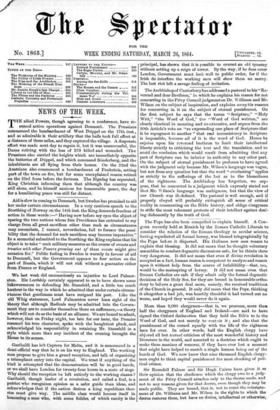The Archbishop of Canterbury has addressed a pastoral to his"
Re- verend and dear Brethren," in which he explains his reason for not concurring in the Privy Council judgmenton Dr. Williams and Mr. Wilson on the subject of inspiration, and explains away his reasons for concurring in it on the subject of eternal punishment. On the first subject he says that the terms "Scripture," "Holy Writ," "the Word of God," the "Word of God written," are clearly identical in meaning and co-extensive, and argues from the 20th Article's veto on "so expounding one place of Scripture that it be repugnant to another" that real inconsistency in Scripture is impossible, because all of it is the word of God. Hence he enjoins upon his reverend brethren to limit their intellectual liberty strictly to criticizing the text and the translation, and to avoid the confusion which would result from admitting that any part of Scripture can be inferior in authority to any other past. On the subject of eternal punishment he professes to have agreed with the judgment only because Mr. Wilson's language was vague, but not from any question but that the word " everlasting" applies as strictly to the sufferings of the lost as to the blessedness of the righteous. The Archbishop has forgotten, we sup- pose, that he concurred in a judgment which expressly stated not that Mr. Wilson's language was ambiguous, but that the view of our Church was ill-defined. The pastoral is well enough, and if properly obeyed will probably extinguish all sense of critical reality in commenting on the Bible history, and oblige clergymen to stifle the most vehement protests of their intellect against deal- ing dishonestly by the truth of God.






























